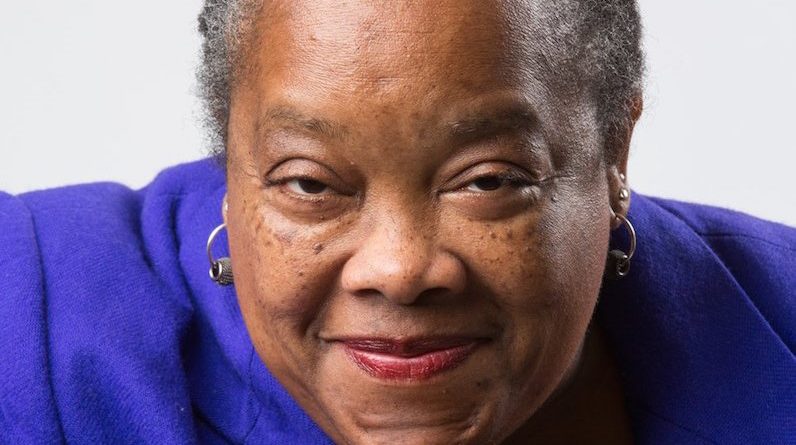Women in Ministry: “Just Like You” by Valerie Bridgeman
When ecclesio.com asked me to curate this week on “women in ministry,” I originally thought, “this will be easy.” It seemed like a natural fit as someone who has been in licensed and ordained ministry for 41 years as of this month, and as someone who has many women friends from across age, denomination, ethnicity, etc. who are in ministry. I have been—in these 41 years—an associate pastor, a co-pastor, a lead pastor, an interim pastor, a hospice chaplain, a community educator in a non-profit organization, a member on non-profit boards, the founder of a non-profit that enhances and trains preachers in their preaching, and a seminary professor, now dean-elect.
I knew very early in my life that I was called to preach. I knew before I said it out loud, and while I pursued God in my child’s mystical heart, sitting in the woods behind our house and listening for God in the wind. I have stories about divine encounters, strange and mundane, that keep me in this “burdensome joy” as Dr. James Massey,[1] one of my childhood mentors, once called it. But I hold as the thunderous “outside” voice in my memory Deacon Jimmy Lee Funderburg. He told me after I had led prayer during children’s day (always the 5th Sunday in our rural Baptist Church in Alabama) that God had called me to preach. I was nine years old. I protested that God didn’t call women to preach. He said, “I don’t believe God calls women to preach either, but I believe God called you!” That was 50 years ago.
Five years later I would be a “dual citizen” of the church, part Baptist and part holiness church (Church of God, Anderson, IND) when I began attending worship with my father in the small church he served as pastor on some weekends, while maintaining my membership at my mother’s church, Pine Grove Baptist Church in Odena, Alabama. The love that shaped me was infused in me by a subversive Sunday School teacher there who reinforced what I was learning from my mother’s faith at home—faith meant thinking and asking questions. Meanwhile, the hymns of the Church of God pulled me into a deeper and deeper relationship with God. The people there loved me as well, but it was in district meetings that I saw and heard my first woman pastor preach. It was normal. Not extraordinary. Expected. It was a vision of the call that hounded me. I surrendered to that call just after I graduated high school.
At this point I could just start throwing statistics around about the stained-glass ceiling[2] or describe how depressing ministry can be for all ministers, but especially women.[3] I could tell you the time the deacon at my home church said I could not stand in the pulpit to preach my mother’s funeral. We threatened to take it next door to “the Sanctified Church,” which had been under Mother Mickey’s leadership for years, but my childhood pastor intervened and I did preach, from the pulpit to eulogize my mother. Or, the time a man hemmed me up in the elevator where I worked, pressed himself against me, and said, “when I see you I don’t see ‘preacher,’ I see all woman,” and threatened to “show me what a real man could do for me.” There are the stories of men saying they were glad they didn’t walk out on a sermon by a woman, and the ones of little children (all genders) walking up to you and telling you that they want to be a preacher “just like you when I grow up.” Or the elderly women who come to you with tears in their eyes and saw that, “I wish I had the courage to answer my call to preach.” My stories are not universal, but they also are not unique. I have heard some variation of them over and over in these years, and still, women keep showing up, like Mary at the tomb. We keep proclaiming that we have seen Jesus. We keep standing against injustices as community leaders, rallying congregants and neighbors to “seek peace and to pursue it” (Psalm 34:14) and to “do justice, love mercy, and walk humbly with God” (Micah 6:8).
This week, I’ve asked five women to tell the story with me. I strove to find a cross section of women whose stories, like mine, are their own, but also a part of a great cloud of witnesses. We represent five denominations, several intersections of hybridity: Catholic-become-UMC pastor; Japanese-American pastor who came to Christianity through a non-denominational church, ordained by the Presbyterian Church (USA), serving in a Methodist new church plant; holiness Pentecostal preacher who counsels some of the nation’s top political leaders; Presbyterian professor activist who lives out her ordained call from the classroom; a Baptist senior pastor who is also a preacher’s kid who once was employed by the US government in communication, and me—mystic, decidedly ecumenical preacher ordained by the Church of God (Anderson, Ind.). Let these stories speak to you. Let them bear record of God’s wonder working power and grace in and through women called.
[1]Dr. James Earl Massey. https://www.macu.edu/academics/massey-leadership-center/dr.-james-earl-massey.html
[2] Eric Ferreri, “Study: Female Church Leaders Face Stained-Glass Ceiling.” Published December 9, 2015 in Campus, Academics, Research. https://today.duke.edu/2015/12/chavesstudy. Accessed June 11, 2018.
[3] Stephanie Dyrness Lobdell, “When You’re a Pastor Who Suffers from Depression,” Christianity Today. https://www.christianitytoday.com/pastors/2017/december-web-exclusives/when-youre-pastor-who-suffers-from-depression.html. Accessed June 11, 2018.
The Rev. Valerie Bridgeman, PhD, is Dean and Vice President of Academic Affairs-elect
and Associate Professor of Homiletics & Hebrew Bible at Methodist Theological School in Ohio. She also is founding president and CEO of WomanPreach! Inc., the premiere organization bringing preachers to full prophetic voice. She is ordained in the Church of God (Anderson, Ind.) with membership at St. Paul’s Baptist Church in Philadelphia (American Baptist Church).

